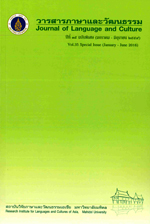Gandhi through the Concept of Nietzsche’s
Main Article Content
Abstract
The advance in science and technology was consistently increasing to make humans live a comfortable life. However, they were destroying their true selves, and they eventually became the master of humans. Existentialism was thus introduced to remind humans to reconsider their true selves. Friedrich Nietzsche, (1844-1900) was an Existentialism philosopher who introduced the idea that opposed to religion doctrine. He explained this in his book, Thus Spoke Zasathustra, through the major character Zasathustra, who conveyed the notion of “The Will to Power” was the background power that drives human to be in power and eventually make creative changes. If they can control and use it in creative ways, they will gain the true power like Mahatma Gandhi (1869-1948), he introduced the notion of “Stayagraha”, which was the practice that had been examined and experimented by himself all his life. He used “The Will to Power” in a creative way by examining and controlling himself physically and mentally in order not to become a slave to passions. However, it was not the act of overcoming all passions like the religion beliefs. Gandhi’s way of life was the way of his true self, and it has become the model for humans to learn and follow.
Article Details
The articles featured in the Journal of Language and Culture (JLC) constitute academic works representing the viewpoints of the respective author(s). It is crucial to note that these opinions do not necessarily reflect those of the Editorial Board.
All articles published in JLC are released under the Creative Commons Attribution 4.0 International License (CC BY 4.0). This license grants permission for unrestricted use, distribution, and reproduction in any medium, provided proper credit is given to the original author(s) and the source.
References
Friedrich, Nietzsche. (n.d.). The perspectives of Nietzsche: Will to power. Translated by Water Kaufmann (online). Retrieved from http://www.theperspectivesofnietzsche.com/nietzsche/nwill.html.
Savita Singh. (2008). Gandhi Smriti: “A moment in the conscience of mankind”. India Perspectives, 22(1), 83-91.
Strathern, Paul. (2002). The essential Nietzsche. London: Virgin Books.


